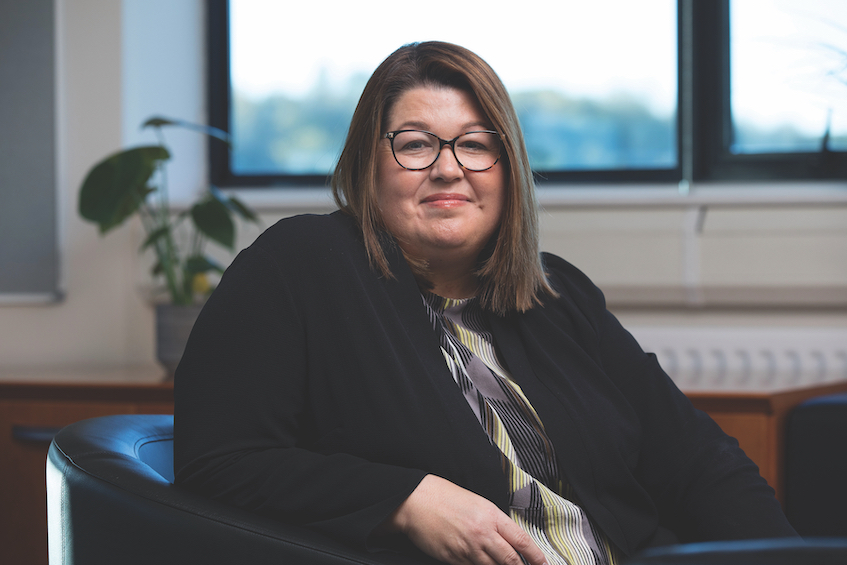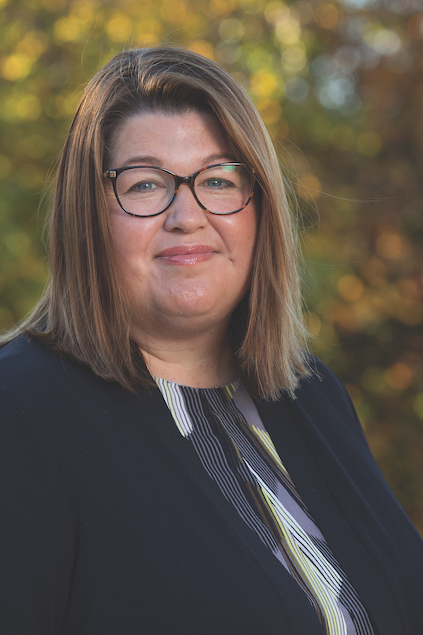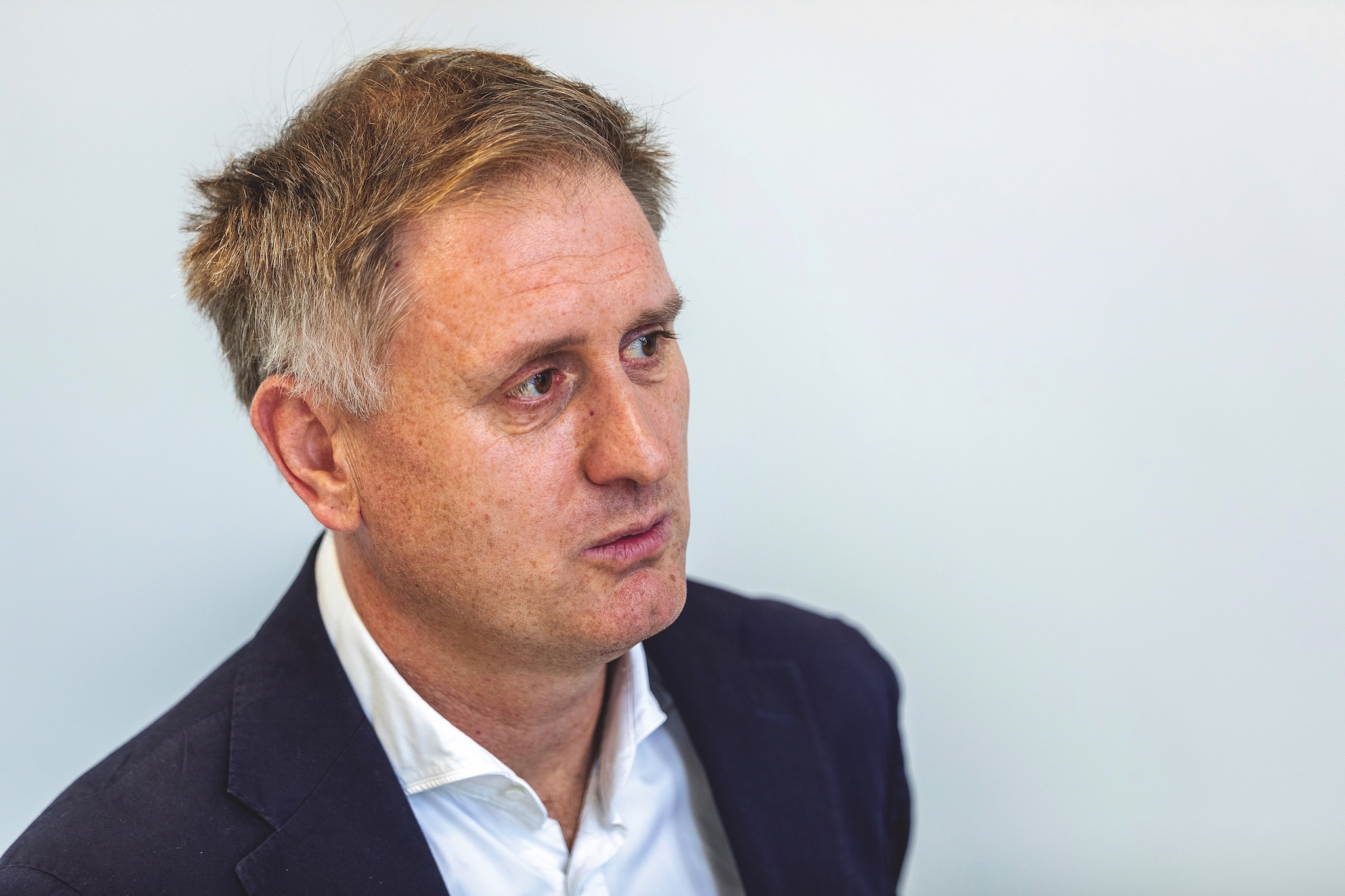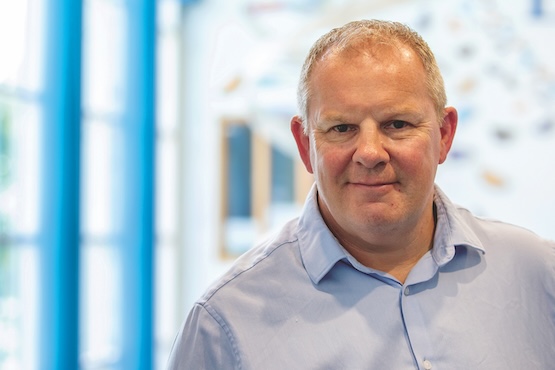There was no career path… I had to find my own way

Former receptionist Sam Allen has risen the hard way to some of the NHS’s most senior jobs. Now, the chief executive of the North-East and North Cumbria Integrated Care Board wants to champion the professionalisation of management and spread the collaborative spirit of mental health services across the NHS.
In the mid-1990s, the then-23-year-old Sam Allen accepted a temping job on reception with a community mental health team in South London. The temping agency was not optimistic: “They’d placed about eight people in the role, and I think they’d all lasted less than a day,” she recalls. “The staff were behind two security doors on the first floor, but the reception just had one of those stable doors; I think that’s why they couldn’t keep people.”
Allen, though, immediately felt at home: “I just loved it – the staff, dealing with patients and family members – and they offered me the job permanently,” she says. It was the start of a career in mental health services that rose through commissioning and service director roles to a six-year stint leading Sussex Partnership NHS Foundation Trust – where she lifted the trust’s CQC ratings from ‘Requires Improvement’ to ‘Good’. And this year, she started her new job as chief executive of the North-East and North Cumbria (NENC) Integrated Care Board: the central decision-making body in an Integrated Care System (ICS) with a £6 billion budget, 170,000 staff, and a patch that reaches from North Yorkshire to the Scottish borders, and from Carlisle to Middlesbrough.
So Allen has risen from the most junior of frontline jobs to the most senior of strategic leadership positions – but it has not been a smooth journey. “I had to find my own way; I wouldn’t say it was the easy route,” she comments. “There was no career path.” She’s had to fit the necessary training and development – from a postgraduate certificate to an MBA – around her day jobs, spending “many nights sat at the dining room table”.
Management is a profession
“I took every one of those opportunities, but they weren’t easy to find,” she says. “I had quite a lot of doors slammed in my face, either because I didn’t have a clinical background or because I didn’t have experience in something.” The NHS, she believes, should pay more attention to creating strong career paths and improving people’s management skills: it’s a mistake to assume “that people who have got experience working in healthcare make good managers, because that’s not always the case. Management is a profession.” It is also, she adds, distinct from leadership – where training is more readily available.
A member of the Chartered Management Institute since 2009, Allen recently became a trustee. She now champions the professionalisation of NHS managers, arguing that “people who undertake management roles should have a competency framework, and should be able to demonstrate that they’re working to it and continuing to learn.” After all, she’s spent her career “managing teams of professional [clinicians] who had codes of conduct, who were professionally accountable, who had to demonstrate continuing professional development annually, who were assessed. I’ve always thought, as a manager, that we weren’t really applying the same standards to ourselves.”
So should NHS managers, like clinicians, require professional accreditation? “Absolutely,” she replies. In clinical work, the public expects “the person they’re receiving care or treatment from to be suitably trained, qualified, keeping their skills up to date, learning new techniques and demonstrating that. I think management is a profession, and we should do the same.” The CMI’s accreditation scheme would operate as effectively in health and care as in other fields, she argues: “We don’t need to reinvent the wheel just because we’re the NHS. Why not take the chartered standard that’s available and on offer and works?”
Allen is also chair of the NHS Confederation’s Health and Care Women Leaders Network, which aims to address the continuing gender gaps in management roles, board positions and salaries. The initiative, she explains, brings together 50 local women’s networks to “support employers with flexible working, look at ways in which employers can support women going through the menopause, and make sure that we’ve got safe working environments – because we still see misogynistic stuff happening, sadly.” And racist stuff, too: “When you look at ethnicity, the situation is even worse,” she comments. “We’ve got a long way to go around inclusion.”
We all do mental health
Her approach to management, forged in mental health services, emphasises collaboration across and beyond the public sector. “Mental health services have been at the vanguard of partnership working, particularly with community and voluntary sector organisations,” she says. “And the reason is because [for patients] in those services, social connections – having somewhere to live, someone to love – are hugely important. So a medical model is not going to deliver the outcomes.”
Improving mental health therefore requires “a more biopsychosocial model of care, not a more medicalised model of care,” she explains. While providing specialist services for those with severe and enduring mental illnesses, mental health practitioners also strive to “build resilience and mental wellbeing in our communities” – and this work depends on other public servants and voluntary sector workers.
Staff across the ICS understand the interdependencies between physical and mental health, Allen says, and services are becoming better connected through reforms such as the introduction of psychiatric liaison services into acute trusts. “But it’s been much more about mental health going and integrating elsewhere; we need to take that a step further,” she adds; it’s time that other public servants leaned in.
“If we could make one step change, for me it would be about equipping everyone who works in health and care with mental health training and expertise,” she says. When other public service professionals encounter people with mental health problems, “there can sometimes be a view that, ‘We don’t do mental health, that’s somebody else’s job.’ Actually, we all do mental health.”
Learning from communities and clinicians
This broad perspective on health and wellbeing sits well with the goals of ICSs – which work to integrate services around patients’ needs, and to collaborate across the public sector in the pursuit of public health. “If we’re about improving the health of our population, the NHS can’t do it on its own,” she says, noting that – alongside access to high quality health and care services – factors such as “lifestyle, education, employment and the quality of housing” play key roles in determining people’s health and wellbeing.
 “The public expects clinicians to be suitably trained, qualified, keeping their skills up to date, learning new techniques and demonstrating that. I think management is a profession, and we should do the same.”
“The public expects clinicians to be suitably trained, qualified, keeping their skills up to date, learning new techniques and demonstrating that. I think management is a profession, and we should do the same.”
The NHS is loved and admired around the world and, “at its best, absolutely outstanding,” says Allen. “But it needs to change. The world is changing: we’ve got an ageing population, medication innovations, higher levels of care need and some real challenges with our workforce – both in terms of attracting and retaining people.” The solutions, she adds, “rest in our communities, in our clinicians on the frontline. They can often tell you what’s not working. And if we give them the time and the space, they are the best people to shape and design services in a way that would better meet the needs of the population.”
The Integrated Care Board (ICB) aims to provide money, direction and momentum for those crucial reforms, Allen explains: “We’re responsible for planning the allocation [of funds], measuring outcomes and experience, and ensuring that we’ve got the plans in place to improve.” But the board won’t define exactly how services should change, instead it will “make sure that these decisions are taken as close to the local populations as can be,” she says. “We have to work shoulder to shoulder with all the partners in the system. What we can do is pull together the plans, allocate the resources, and make sure that we’ve got line of sight on the data.”
Given the ICS’s vast footprint, this is the only feasible way to operate, and NENC’s patch is subdivided into four subsidiary Integrated Care Partnerships “The smallest ICB looks after a population of about 300,000; we’re at 3.2 million, so we’ve got to have a very devolved structure that enables us to do things really well at neighbourhood and place” levels, Allen comments. “But equally, our size enables us to do a small number of things at scale.”
Local goals and national targets
The ICS’s direction of travel, meanwhile, will be shaped by its recently published draft Integrated Care Strategy (mip.social/nenc-ics-strategy). Produced by the Integrated Care Partnership – which brings the ICB together with local authority and voluntary sector representatives – the strategy focuses on health inequalities: it aims, for example, to cut the gap in life expectancy between the richest and poorest neighbourhoods by 25% by 2030, and to reduce the region’s suicide rate to the England average. The document is clear-sighted about the challenges facing health and care – highlighting, for example, ever-lengthening waiting times – and pledges to invest in proportion to communities’ needs, channelling funds towards the most deprived areas.
Meanwhile, how can the ICB relieve some of the immediate pressures on health and care services? “We’ve got three core priorities,” Allen replies: clinical triage to divert people away from A&Es; extended access to primary and urgent care; and improving hospital discharge arrangements. Meanwhile, it will be working to address the elective care backlog. This is a “must do”, she says, but “we need to put similar rigour into addressing some of the other care backlogs”, citing “young people’s mental health, particularly autism and neurodevelopmental diagnosis”.
It’s important, Allen believes, that ICBs have the freedom to pursue local goals alongside national targets. “We need to make sure that we leave room to tackle our local priorities,” she says. “If everything is dictated nationally, then our role changes; we’ll become the implementers of national plans and requirements. The big opportunity with ICSs is determining those local priorities and what matters most to our population.”
Behind all these plans, of course, looms the challenge of promoting partnership working and service integration at a time when tight budgets create pressure for health and care organisations to focus on their core roles. There is a risk that “people shrink back”, she acknowledges, with providers getting “into cuts and making unilateral decisions. But actually I’m seeing the opposite here – there’s a real commitment to keep working together.”
Carriers of hope
The ICB must “be realistic about what we’re facing in terms of the fiscal environment,” she continues, but meanwhile, “we need to be the carriers of hope.” Strengthening collaboration across the system, she believes, is the only way to tackle the structural problems undermining the efficiency and effectiveness of our health and care services – and, ultimately, to relieve the pressure on services and staff. So “this is a moment when we need to galvanise our partnerships. We need to come together to take those difficult decisions. And we need to support one another.”
Allen doesn’t underestimate the scale of the challenge, comparing our situation to the era of post-war austerity faced by her grandparents. “It was really tough; but there was a real spirit of determination there,” she says. “Sometimes to look forward, we have to look back. This is going to be hard, hard work; but it could be a real galvanising moment for us, if we can bring a grounded, optimistic hope to this.”
The ICS’s work is “about making a step change for the people in our communities; that’s what’s bringing people together,” she concludes. “And in making that step change, we’re all going to have to change ourselves if we’re really going to integrate care and join things up for people. We’ve got a real opportunity here, and it’s incumbent on all leaders to seize it.”
- Sam Allen also took part in the ‘No managers, no NHS!’ panel discussion at the MiP Summit in November.
Related News
-

“Showing kindness and trust creates a virtuous circle – people respond well to that”
As chief executive of Suffolk and North East Essex, one of England’s most highly rated integrated care boards, Ed Garratt has pioneered a radically different approach to leadership – one based around kindness, trust and putting down deep roots in local communities. He talks to Healthcare Manager’s Matt Ross.
-

We need to give managers reasons to join the profession — not risks to avoid
Steve McManus’s work developing the leaders and managers the NHS needs for the 21st century has caught the eye of national leaders. The Royal Berkshire trust chief executive talks to Matt Ross about transforming services, developing leaders and the right way to regulate the management profession.
-

Interview: Dr Phil Hammond, doctor, comedian, health campaigner
Doctor, comedian, broadcaster, writer, health campaigner and politician manqué, Dr Phil Hammond is now drawing up a manifesto to rescue the NHS and boost the nation’s health. On the eve of a watershed general election for the UK, he spoke to Healthcare Manager’s Matt Ross.